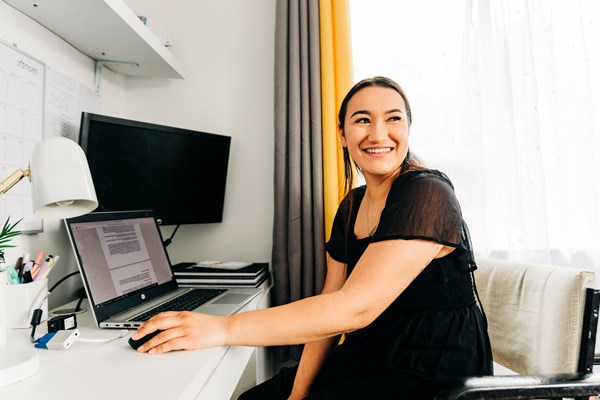Income holds your life together.
For most of us, our financial independence revolves around earning money to support ourselves and our loved ones. It’s fair to say that without income from a job or business, it can be very difficult to meet basic needs, i.e. food, shelter, clothing and transport.
Your income-earning ability may also provide the foundation for your financial future. The money you earn can help you work towards an emergency fund, pay off loans or save for your retirement.
What happens when your income is interrupted?
It’s likely you know someone whose work life has been interrupted by sickness, injury or recovery from an accident. These events are part of life, but it’s natural to assume they’ll never happen to you. Until something does. Then what’s your backup plan?
Many New Zealanders might think that they’ll get government help to cope financially if they can’t work because of a health problem. After all, we have ACC and WINZ benefits to fall back on. However, it’s important to consider:
- Sick days and annual leave may not be enough to cover an extended period of absence from work, due to sickness or injury.
- ACC only covers injuries caused by an accident. It doesn’t provide anything if you get sick.1
- You might qualify for Jobseeker Support if you have to take time off work due to sickness or disability, but it may not be enough to live on – especially if you have dependents.2
1Source: https://www.acc.co.nz/im-injured/what-we-cover/injuries-we-dont-cover
2Source: https://www.workandincome.govt.nz/products/a-z-benefits/jobseeker-support.html
When a household is affected financially because a key income earner can’t work – and doesn’t have life insurance to help – savings can often be the fallback position. Are they enough? When they’re gone, what happens next? A survey by the Financial Services Council (FSC) of New Zealand in 2022 found that most working New Zealanders have less than six months’ worth of backup savings. The same FSC research showed that 40% of New Zealanders would be unable to access $5,000 (without going into debt), if they needed it in an emergency.3
3Source: https://blog.fsc.org.nz/2022-research-financial-resilience-index
If sickness or injury affected your ability to work, how long could you get by?
Income protection insurance can help out in hard times.
When faced with a loss of income due to sickness or injury, income protection cover may present a useful solution. It’s a type of life insurance that’s designed to replace part of your income if sickness or injury means you can’t work for an ongoing period.
If you get Income protection cover from Fidelity Life, up to 75% of your gross annual income can be covered (maximum amounts apply). Payments start after a defined waiting period (from 2 weeks to 2 years) selected by you when you sign up for cover. When you’re organising cover, you also get to decide how long you want payments to continue for, once your claim is accepted.
Both the waiting period and duration of payments affect the cost of your cover. For example, a longer wait period and a shorter payment duration cost less. We recommend you talk with a financial adviser about the best approach for you.
With Fidelity Life, income protection cover also comes with these benefits:
- Additional family member payment. If your illness or injury means, under medical advice, you are confined to bed and require full time care, we'll pay the Family member support benefit. This is where a payment of up to $3k per month could be made, if one immediate family member’s income stops, in order to provide care.
- Help while under nursing care. This provides additional financial support for hospitalisation or medically supervised bed care during the waiting period of up to 90-days.
- Rehabilitation and retraining. If you undertake an approved rehabilitation programme, for the purpose of retraining or re-education to help you return to work, you may receive additional financial support on top of the regular monthly payment.
- Recovery support. This can be payable in addition to the monthly benefit, to assist in recovery and rehabilitation costs such as buying a wheelchair, prosthetic devices, or house and car modifications should they be required.
- Earlier payment for recurring claims. If you suffered a recurrence of the same or related sickness or injury within 12-months of returning to work, the waiting period will be waived meaning you will receive payment earlier.
Ready to find out more? Get in touch.
What happens when you make an income protection insurance claim?
When an Income protection cover claim is approved, and the wait period that you selected has passed, you’ll start to receive payments. The money you receive can be used for anything – and could be helpful for daily living expenses, loan payments, utility bills, school fees or whatever else you need to pay. It’s totally up to you how the money gets used.
If you’ve lost income because you’re unable to work due to sickness or injury (and you continue to meet the claim definition), you'll receive monthly payments until whichever of these comes first:
- Your chosen payment period ends; or
- You reach age 65 or 70, depending on your occupation.
As always, we recommend speaking to a financial adviser if you’re uncertain about which options are right for you.
One more benefit of income protection insurance? Peace of mind.
Aside from the practical benefits of getting monthly payments if you’re sick or injured, having income protection can help you feel less worried about the future. In the same way that you can sleep better knowing your house is insured, you may feel reassured that there’s a financial safety net under your earning ability if life throws you a curveball.
Get expert advice to find the right income protection for you.
Have you been searching ‘income protection insurance nz’ to find the best income protection insurance in New Zealand? For help with selecting an income protection provider, and making good choices about wait periods and payment duration, we recommend you contact a financial adviser. You can ask questions, consider various solutions and there’s no obligation to buy.
DISCLAIMER: The information contained in this article is a summary of the key points of the insurance cover(s) mentioned and is general in nature. This article does not constitute a financial advice service. All covers are subject to the definitions, standard exclusions/limitations, terms and conditions contained in the full policy documentation which is available from Fidelity Life or your financial adviser who holds a Distribution Agreement with Fidelity Life. All applications for cover are subject to underwriting criteria.






